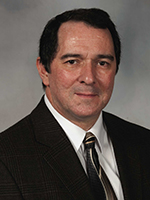Pandemic produces dip in routine cancer screenings, putting patients at risk for undiagnosed disease
As the Delta variant continues to ravage Mississippi and some people are again staying close to home, should regularly scheduled screenings for cancer wait?
Experts at the University of Mississippi Medical Center’s Cancer Center and Research Institute say delaying recommended screenings is a no.

“As pandemic malaise sets in, some people are not inclined to do something that they might not have wanted to do in the first place,” said Dr. William Robinson, professor of gynecologic oncology and hematology-medical oncology. “Just because you currently have no history of colon cancer and you’re between 45 and 56 “doesn’t mean you aren’t going to get it,” Robinson said. “Screening is just as valuable (post age 50) as when you were 50.”
The American Cancer Society and American College of Obstetricians and Gynecologists recommend:
- Cervical cancer screening should start at age 21 with a pap smear. A human papillomavirus test may be added for women over 25.
- Breast cancer screening beginning at 45, but with the option to begin at age 40 for women with risk factors
- Colorectal cancer screening beginning at age 45
- African Americans should discuss prostate cancer screening with a doctor at age 40
- People who currently or formerly smoked should discuss lung cancer screening with a doctor at age 50
- All men should discuss prostate cancer screening with a doctor at age 50.
When physicians and patients think about which screening is the most unpleasant, he said, the answer usually is colorectal cancer, which requires a colonoscopy. “It’s not a terrible surprise that it’s the hardest one to get people back to,” Robinson said. “But, it’s never too late. People might say ‘It won’t help me at this point,’ but that’s not true. It’s never too late to do a screening test.”

“Over the past two decades, the occurrence of colorectal cancer has increased by nearly 15 percent in Americans who are between the ages of 40 and 49,” said Dr. Roy Duhe, professor of pharmacology and toxicology. “This means our nation has reached a point where approximately 10 percent of all colorectal cancers occur in Americans before they reach the age of 50.
“I’ve had a screening colonoscopy myself and found that it wasn’t a bad experience,” he said. “The minor inconvenience was well worth the peace of mind I had knowing there were neither any pre-cancerous polyps nor any cancers in my colorectal tract.
Women whose age makes them candidates for a pap smear to detect cervical cancer should not delay, said Robinson, who directs the clinical research program at CCRI. “That’s why Mississippi has one of the highest rates of cervical cancer in the country. We have almost double the rate, and we know why,” he said.
“A doctor might ask their patient, ‘When was your last pap smear?’ The patient might say, ‘When my last child was born,’ and the patient is 50 now.”
Providers can calculate the risk a person has of developing lung cancer – something difficult to do previously, Robinson said. UMMC physicians offer a low-dose CT scan to detect lung cancer. It’s easy and painless; the patient lies on a table, and an X-ray machine uses a low dose of radiation to make detailed images of the lungs.
“Anyone who has been a smoker or exposed to a smoker in the household for more than a year are at risk and should have a low-dose CT screen,” Robinson said.
The American Cancer Society and the national Commission on Cancer are addressing reports that the number of screenings performed has dipped due to the pandemic. “Recent numbers suggest screenings have gone down, but there’s not a national database,” he said. “We report cancer at UMMC, but cancer screenings (nationally) are not reportable.”
Although concerns about getting out in public during a pandemic are understandable, Robinson said, screenings are important, and especially for people at risk. Health care facilities take precautions to minimize any chance a patient could come in contact with the virus during treatment or office visits.
“Whether you took precautions or not, or have had the vaccine or not, the health care providers who do the screening have taken precautions,” Robinson said. “Their practices have changed dramatically in the last year. We’ve changed how we move patients around, our cleaning practices, and who is in contact with patients.”
To get started on screenings, Robinson said, “we strongly emphasize that you go and see your primary care provider.”
All recommended cancer screenings should be taken seriously, no matter which is indicated for what patient, Robinson and Duhe say.
“We need to continue to remind people of the importance of getting screened, because colorectal cancer screening literally saves lives,” Duhe said. “That might be your life, or it might be the life of someone you love, so get screened.”
Cancer screenings save lives. Schedule a cancer screening with UMMC at www.umc.edu/CancerScreening.
The above article appears in CONSULT, UMMC’s monthly e-newsletter sharing news about cutting-edge clinical and health science education advances and innovative biomedical research at the Medical Center and giving you tips and suggestions on how you and the people you love can live a healthier life. Click here and enter your email address to receive CONSULT free of charge. You may cancel at any time.



